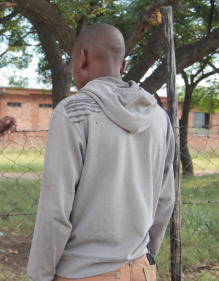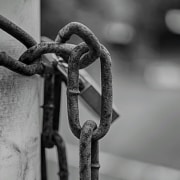|
Getting your Trinity Audio player ready...
|
 By Valencia Talane
By Valencia Talane
Parts one and two of our new series have highlighted different aspects of being a whistleblower. In part three, we read about a man who is helping to show his community that ordinary people speaking out is an important part of fighting corruption. Chris Setusha, a teacher at Mmutle High School in Hammanskraal north of Pretoria, is ready to reveal his identity.
Several months ago Setusha reported anonymously to Corruption Watch, citing abuse of power by his principal Charles Modjadji in a theft and burglary case involving two youngsters, one of whom was Setusha’s pupil at the time of the alleged crime.
He alleged at the time that the two, cousins Jason and Calvin Chaane, had been coaxed by Modjadji to break into the administration block at night and steal computers and bicycles belonging to the school. The two filed an affidavit with the nearby Marapyane police in which they implicated Modjadji as the mastermind behind the robbery for which they had been arrested.
“The principal told me he would place the keys under the door mat so that I can go in and take the computers and bicycles from the school, and he would come fetch them from my home that evening,” Jason told Corruption Watch at the time. The reward for this criminal act, he claimed, was that he would be guaranteed a pass to the next grade come the end of the year, regardless of how he actually performs in the examinations.
After the robbery, the bicycles and computers were allegedly taken to Jason’s home, where they were discovered by his elder brother, who reported this to the school. The cousins were both arrested on 27 January 2012 for theft. Their first court appearance was in May, where the case was remanded until September. By the time the second court appearance came about, Calvin had been arrested for another crime of theft. “At the September hearing, he was brought to court in a police vehicle, and when I asked why this was, I was told that he’d been arrested shortly after the May appearance,” explains Setusha.
“What is most disturbing is that those boys have lost their chance at a good future. The community knows that this sort of thing happens regularly and more pupils are used by the principal, but everyone is scared to speak out.”
Setusha says many people in the area trust him enough to confide in him what they know or suspect, but tend to backtrack when he suggests that they tell the police what they know. In Jason’s case, it was the youngster who approached Setusha for advice when he realised how much trouble he was in.
“I see Jason quite regularly now, and I must say that his whole disposition has changed. He is back to being the Jason that I know and taught, calm and obedient.”
Comeback for Setusha
According to Setusha, members of the community remain afraid to speak out against Modjadji. His colleagues have told him of the principal’s continued power over his learners. “Some of the learners have been bold enough to come to me directly and tell me the things that the principal is allegedly planning against me.”
At some point his son’s safety was threatened. “The principal apparently told a colleague that in order to sort me out, he’d have to make an example of my son and try to get him hooked on drugs.
“I never confronted him about this, but I warned my son – who is 19 years old – to always be on the lookout for anyone offering him anything out of the ordinary. I even told him to retaliate and beat that person up if it ever happens.”
Setusha adds that he doesn’t want the principal “thinking he will always be able to get away with his tricks”.
On a professional level, Setusha claims, Modjadji fights him by trying to turn the school’s governing boy – of which Setusha is a member – against him. “Every time we are scheduled to have an SGB meeting, he meets with the parent component of the body first, probably to influence their thinking ahead of the broader meeting.”
Not prepared to let things continue unchallenged, Setusha wrote to the education department, which sent an official to investigate the workings of the SGB. No report or feedback has been made available on the investigation.
Modjadji also challenged a request by Setusha to the SGB in which he asked to be given the mandate by the body to investigate a possible case of arson in the school’s administration block in June. “His argument was that I would use some of the pupils in my investigation, which would interrupt their learning.
“There is so much that is wrong with our school, and yet the principal’s focus is on things that do nothing to help restore it.”
About turn
One of Setusha’s reasons for wanting to remain anonymous initially at the time of Corruption Watch’s investigation was that he did not want to be victimised as a result of speaking out. He has since changed his mind, however, and says he wants to lead by example. He says that he’s annoyed by the fact that many people are prepared to talk to him about whatever wrong they see the principal doing, but are afraid to reveal their identity.
“The only way I know of his [Modjadji’s] reaction is through what I’ve been told by colleagues. He was very angry with me,” Setusha says. “He has not confronted me at all though, and I’m not afraid.”
What he is worried about, however, is what he calls the police’s lack of interest in getting to the bottom of the case. “I have to be frank and say that I’ve lost faith in the police in our area. With all the information they have at their disposal, they could have done more on this case by now.”
To understand why the people of Seabe village have such an intense fear of authority and speaking out, is to understand the background of such a small and poor community in which people rely heavily on each other. “A simple thing such as a threat to bewitch someone or their family can have a profound impact on how a person reacts, even to wrongdoing in their neighbourhood,” explains Setusha.
“I get constant anonymous calls where the person on the other hand does not speak when I answer. I reported this to my service provider and the advice I got was to go to the police who would then work with them to investigate.”
He remains vigilant when he travels to school, he says, because of the 80km distance involved – “but because I trust in God, I know I am protected at all times.”









